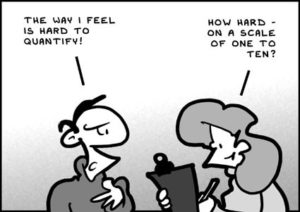Trochim’s stance on the qualitative-quantitative debate is that it’s ‘much ado about nothing’ (Trochim, 2006). He believes in the value of a ‘mixed methods’ approach and goes so far as to claim that, ‘At the level of the data…there is little difference between the qualitative and the quantitative.’ He claims that, ‘All qualitative data can be coded quantitatively,’ stating that ‘Anything that is qualitative can be assigned meaningful numerical values.’ The example he goes on to give, of open-ended survey responses being categorised into themes and, thereby, being quantifiable goes some way towards proving this point. However, the question that this raised for me is, what are data? Data are not necessarily numerical and data might be complex accounts of experiences or observations which can’t – readily – be quantified.
Perhaps because I am interested in a more qualitative approach, I found his claim that, ‘All quantitative data is based on qualitative judgment,’ (sic) less problematic. As he exemplifies in his deconstruction of a survey response about capital punishment, there is an array of questions which arise around the meaning and meaningfulness of any respondent’s choice.
Trochim goes on to state that his belief is that the qualitative-quantitative debate is, at its heart, a philosophical and not a methodological one. It is epistemological approaches which differentiate quantitative from qualitative research, not methods.
Trochim, W. (2006). The Qualitative Debate. Social Research Methods. http://www.socialresearchmethods.net/kb/qualdeb.php


Really excellent reflection on the Trochim piece here Helen.
I think it is really important to think about these ‘qualitative’, ‘quantitative’ and ‘mixed’ categorisations as we explore methods, especially in the sense of doing so to critique simplistic distinctions between methods.
‘However, the question that this raised for me is, what are data? Data are not necessarily numerical and data might be complex accounts of experiences or observations which can’t – readily – be quantified’
I would also question the idea that ‘All qualitative data can be coded quantitatively,’, but also to suggest that just because something *can* be coded quantitatively, doesn’t make it necessarily useful to do so.
One *could* quantify ‘complex accounts of experiences’ in some way, but to do so would seem to imply a particular view of ‘experience’: for example, that it can be defined according to distinct categories (and not others), that it has limits that can be ‘discovered’, that there is a definitive way to count and categorise it, and so on. One *could* do that, but it would be advancing a fairly contestable idea of what experience *is*?
Perhaps this is where you final comments about epistemological position come in. ‘What we believe about knowledge’ defines whether we ‘count’ or ‘describe’ phenomena, for example?
‘Perhaps this is where you final comments about epistemological position come in. ‘What we believe about knowledge’ defines whether we ‘count’ or ‘describe’ phenomena, for example?’
Absolutely. I can’t begin to contemplate how I could, for example, quantify the findings of last week’s ethnographic ‘adventure’ (http://www.helenwalker.org/observation/). The positivist stance of aligning validity with quantifiable data devalues the rich, complex data which emerges from much research.